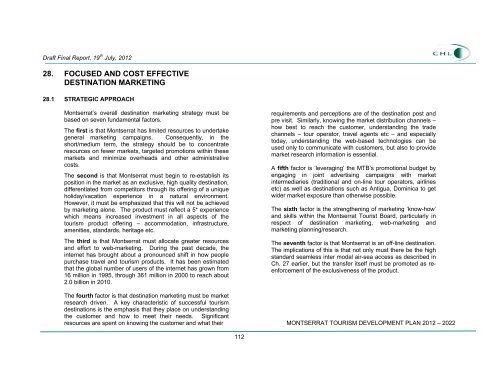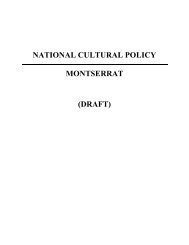downloadable - Visit Montserrat
downloadable - Visit Montserrat
downloadable - Visit Montserrat
Create successful ePaper yourself
Turn your PDF publications into a flip-book with our unique Google optimized e-Paper software.
Draft Final Report, 19 th July, 2012<br />
28. FOCUSED AND COST EFFECTIVE<br />
DESTINATION MARKETING<br />
28.1 STRATEGIC APPROACH<br />
<strong>Montserrat</strong>’s overall destination marketing strategy must be<br />
based on seven fundamental factors.<br />
The first is that <strong>Montserrat</strong> has limited resources to undertake<br />
general marketing campaigns. Consequently, in the<br />
short/medium term, the strategy should be to concentrate<br />
resources on fewer markets, targeted promotions within these<br />
markets and minimize overheads and other administrative<br />
costs.<br />
The second is that <strong>Montserrat</strong> must begin to re-establish its<br />
position in the market as an exclusive, high quality destination,<br />
differentiated from competitors through its offering of a unique<br />
holiday/vacation experience in a natural environment.<br />
However, it must be emphasized that this will not be achieved<br />
by marketing alone. The product must reflect a 5* experience<br />
which means increased investment in all aspects of the<br />
tourism product offering – accommodation, infrastructure,<br />
amenities, standards, heritage etc.<br />
The third is that <strong>Montserrat</strong> must allocate greater resources<br />
and effort to web-marketing. During the past decade, the<br />
internet has brought about a pronounced shift in how people<br />
purchase travel and tourism products. It has been estimated<br />
that the global number of users of the internet has grown from<br />
16 million in 1995, through 361 million in 2000 to reach about<br />
2.0 billion in 2010.<br />
The fourth factor is that destination marketing must be market<br />
research driven. A key characteristic of successful tourism<br />
destinations is the emphasis that they place on understanding<br />
the customer and how to meet their needs. Significant<br />
resources are spent on knowing the customer and what their<br />
requirements and perceptions are of the destination post and<br />
pre visit. Similarly, knowing the market distribution channels –<br />
how best to reach the customer, understanding the trade<br />
channels – tour operator, travel agents etc – and especially<br />
today, understanding the web-based technologies can be<br />
used only to communicate with customers, but also to provide<br />
market research information is essential.<br />
A fifth factor is ‘leveraging’ the MTB’s promotional budget by<br />
engaging in joint advertising campaigns with market<br />
intermediaries (traditional and on-line tour operators, airlines<br />
etc) as well as destinations such as Antigua, Dominica to get<br />
wider market exposure than otherwise possible.<br />
The sixth factor is the strengthening of marketing ‘know-how’<br />
and skills within the <strong>Montserrat</strong> Tourist Board, particularly in<br />
respect of destination marketing, web-marketing and<br />
marketing planning/research.<br />
The seventh factor is that <strong>Montserrat</strong> is an off-line destination.<br />
The implications of this is that not only must there be the high<br />
standard seamless inter modal air-sea access as described in<br />
Ch. 27 earlier, but the transfer itself must be promoted as reenforcement<br />
of the exclusiveness of the product.<br />
MONTSERRAT TOURISM DEVELOPMENT PLAN 2012 – 2022<br />
112



